Alerid D Tablet 10's
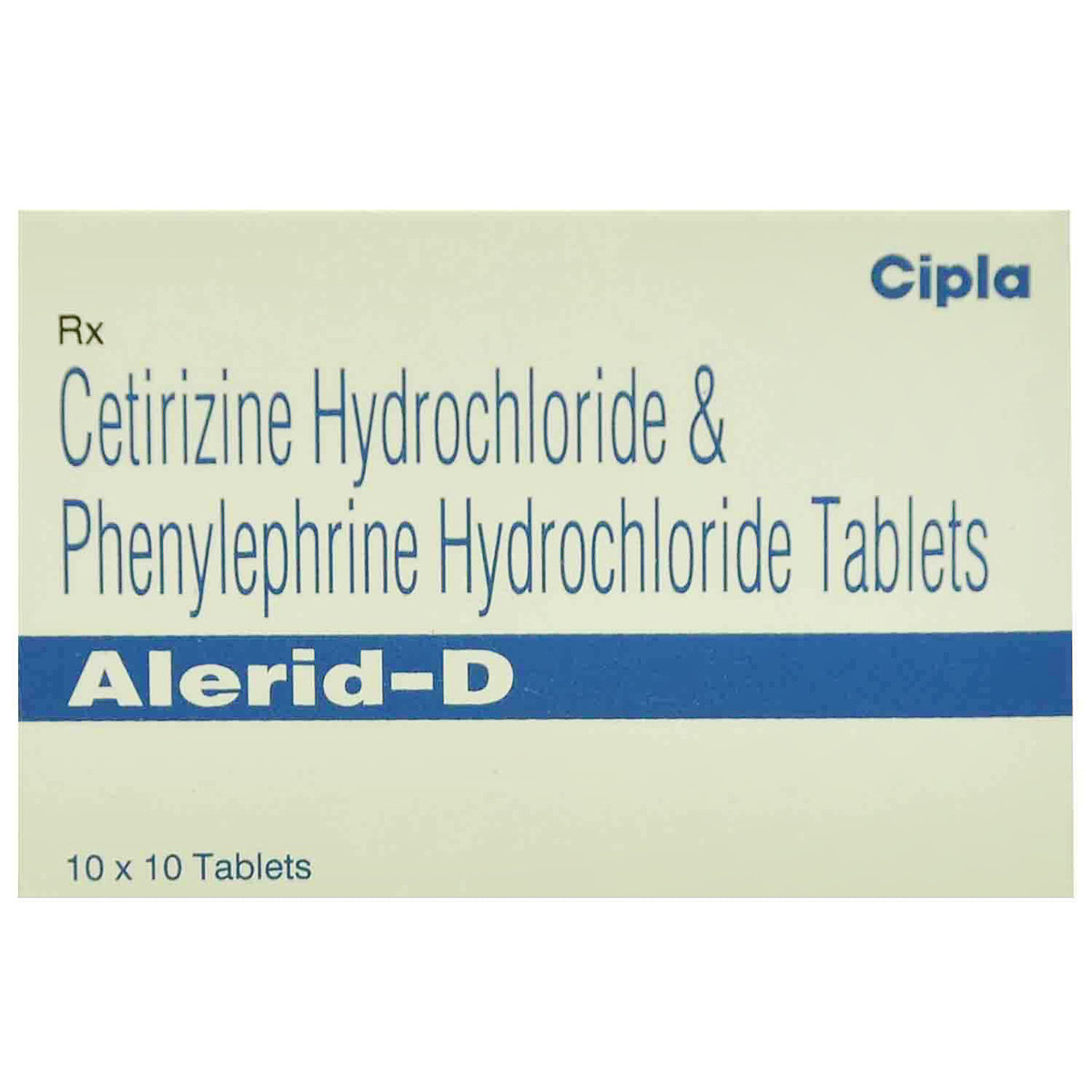
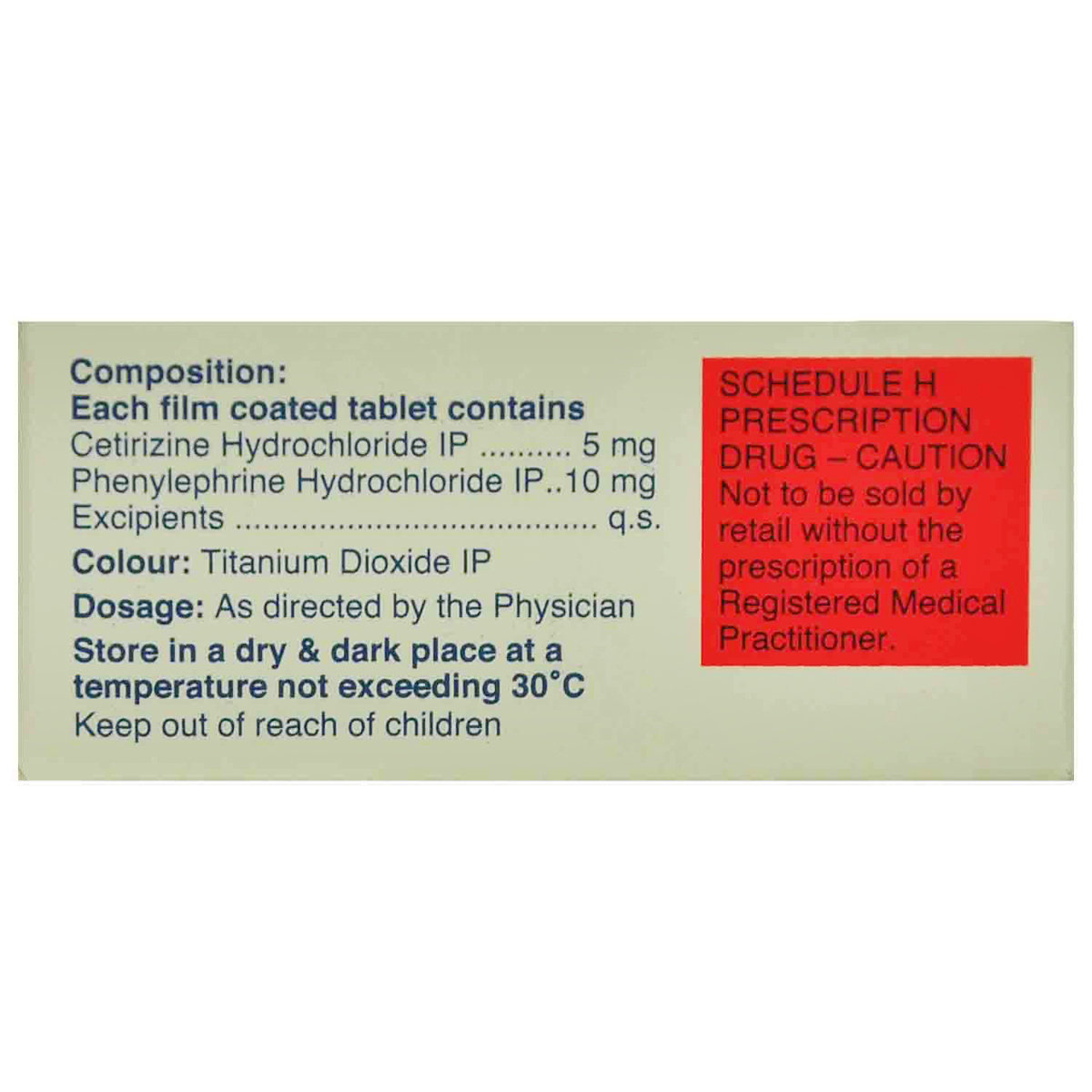
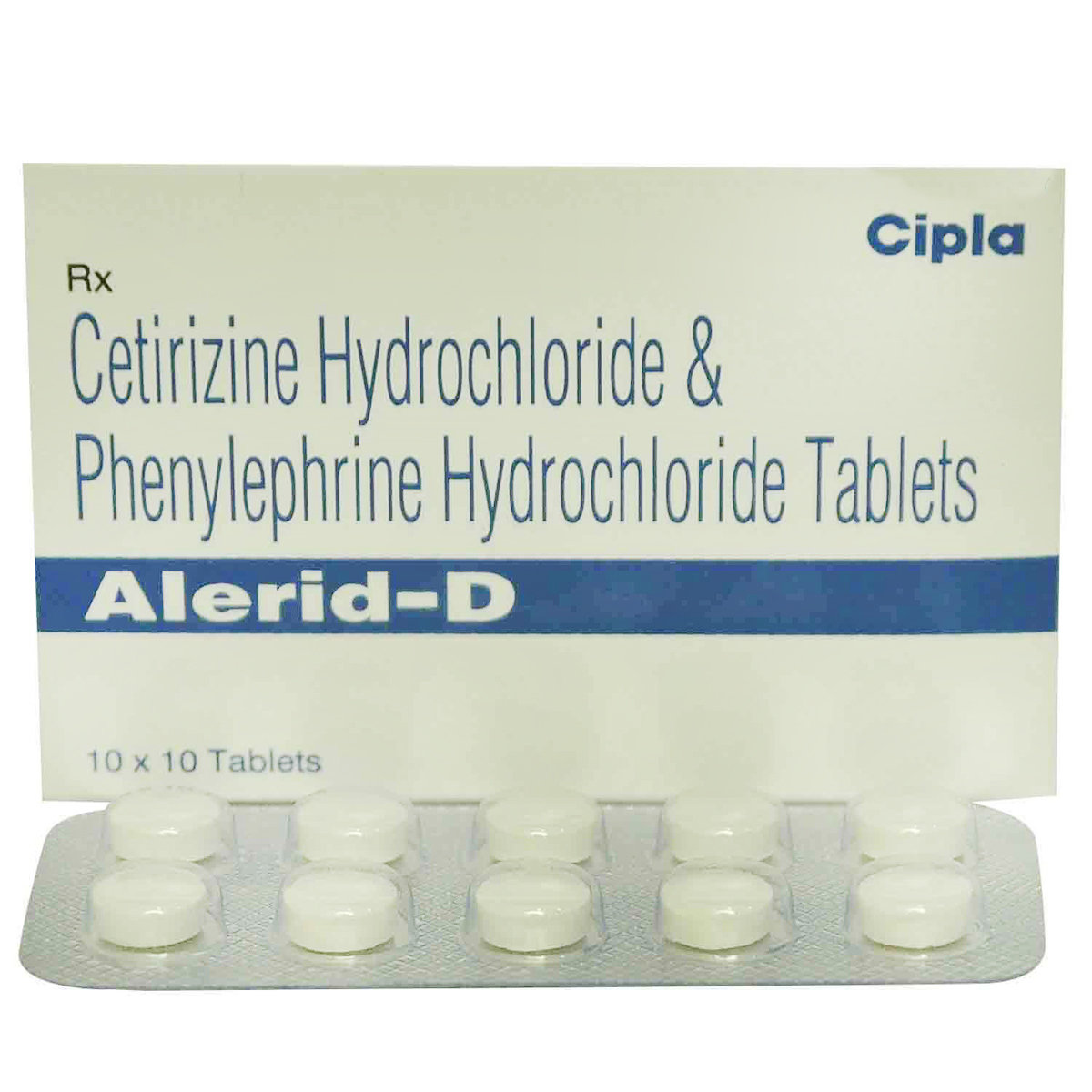
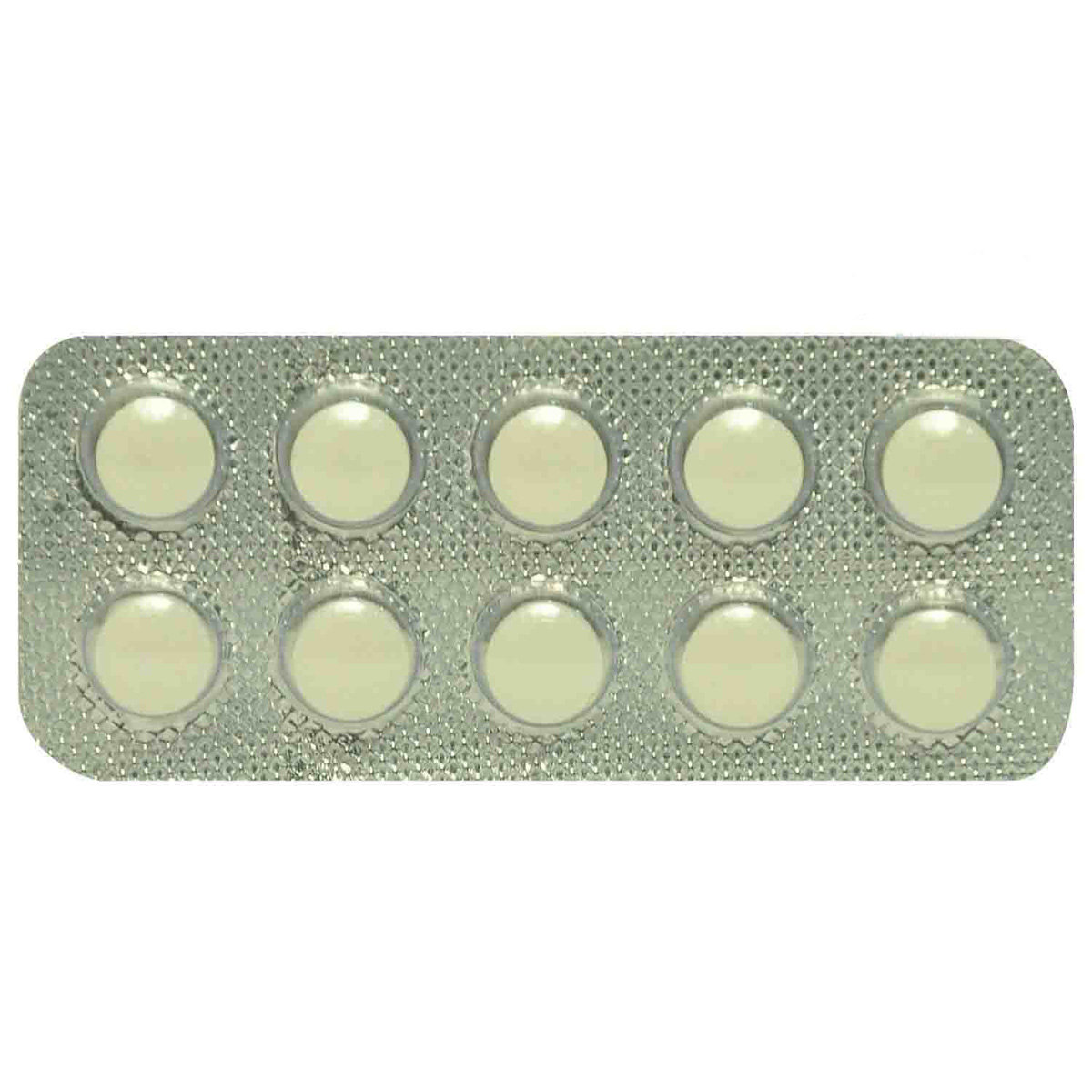
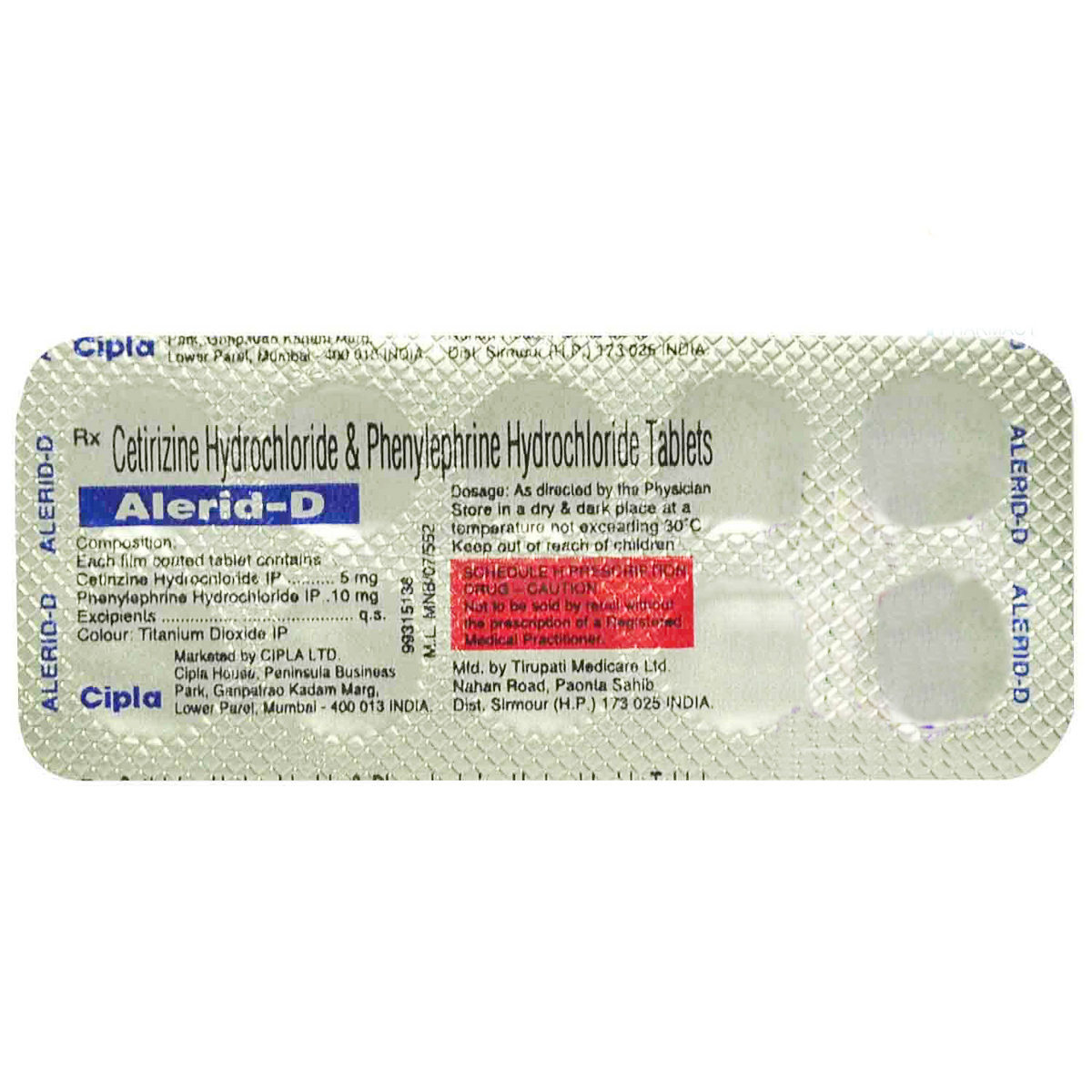





MRP ₹59.5
(Inclusive of all Taxes)
₹8.9 Cashback (15%)
Provide Delivery Location
Online payment accepted
 Prescription drug
Prescription drugWhats That
Composition :
Manufacturer/Marketer :
Consume Type :
Expires on or after :
Return Policy :
About Alerid D Tablet
Alerid D Tablet is composed of two medicines, namely Cetirizine (antihistamine) and Phenylephrine (decongestant). Cetirizine belongs to the class of antihistamines (anti-allergic drugs) that works by blocking the action of histamine, a substance responsible for causing allergic reactions. It helps relieve allergy symptoms such as sneezing, running nose, watery eyes, itching, swelling, congestion, or stiffness. Phenylephrine helps in shrinking the blood vessels in the nostrils and the passage and reducing stuffy nose. Collectively, both of them help to get relief from symptoms.
Alerid D Tablet can be taken with or without food with a glass of water. Please take it in dose and duration as advised by your doctor for the best results. Some people may experience nausea, dryness in the mouth, vomiting, headache, sleepiness, tiredness. Most of these side effects of Alerid D Tablet do not require medical attention and gradually resolve over time. However, if the side effects persist or worsen, please consult your doctor.
Do not take Alerid D Tablet if you are allergic to Alerid D Tablet , cetirizine (anti-histamines), phenylephrine (decongestants) or any of its ingredients. Increase the intake of fluids to avoid excessive dry mouth caused due to Alerid D Tablet as continued dryness can lead to dental disease (gum disease, fungal infection, tooth decay). Intake of alcohol, tobacco, grapefruit, St. Wort plant (a plant used to treat depression) along with Alerid D Tablet is contra-indicated. If you are pregnant or breastfeeding, please do not take Alerid D Tablet as it may lead to unpleasant side effects. Do not take Alerid D Tablet if you have liver or kidney problem, sinus (nasal congestion), diabetes, enlarged prostate, kidney or liver disease, overactive thyroid, high blood pressure (hypertension), glaucoma (increased eye pressure).
Uses of Alerid D Tablet
Directions for Use
Key Benefits
Alerid D Tablet is primarily used to treat hay fever and common cold symptoms like nasal congestion and sneezing. It is composed of two medicines, namely Cetirizine (antihistamine) and Phenylephrine (decongestant). Cetirizine belongs to the class of antihistamines (anti-allergic drugs) that works by blocking the action of histamine, a substance responsible for causing allergic reactions. It helps relieve allergy symptoms such as sneezing, running nose, watery eyes, itching, swelling, congestion, or stiffness. Phenylephrine helps in shrinking the blood vessels in the nostrils and the passage and reducing stuffy nose. Collectively, both of them help to get relief from symptoms.
Storage
- Avoid driving or operating machinery or activities that require high focus until you know how the medication affects you.
- Maintain a fixed sleeping schedule, create a relaxing bedtime routine and ensure your sleeping space is comfortable to maximize your sleep quality.
- Limit alcohol and caffeine as these may worsen drowsiness and disturb sleep patterns.
- Drink plenty of water as it helps with alertness and keeps you hydrated and for overall well-being.
- Moderate physical activity can improve energy levels, but avoid intense workouts right before bedtime.
- Hydrate your body: Drink enough water to prevent dehydration and headaches.
- Calm Your Mind: Deep breathing and meditation can help you relax and relieve stress.
- Rest and Recharge: Sleep for 7-8 hours to reduce headache triggers.
- Take rest: lie down in a quiet, dark environment.
- Cold or warm compresses can help reduce tension.
- Stay Upright: Maintain good posture to keep symptoms from getting worse.
- To treat headaches naturally, try acupuncture or massage therapy.
- Over-the-counter pain relievers include acetaminophen and ibuprofen.
- Prescription Assistance: Speak with your doctor about more substantial drug alternatives.
- Severe Headaches: Seek emergency medical assistance for sudden, severe headaches.
- Frequent Headaches: If you get reoccurring headaches, consult your doctor.
- Headaches with Symptoms: Seek medical attention if your headaches include fever, disorientation, or weakness.
- Inform your doctor about dizziness symptoms. They may adjust your medication regimen or prescribe additional medications to manage symptoms.
- Follow your doctor's instructions for taking medication, and take it at the same time every day to minimize dizziness.
- When standing up, do so slowly and carefully to avoid sudden dizziness.
- Avoid making sudden movements, such as turning or bending quickly, which can exacerbate dizziness.
- Drink plenty of water throughout the day to stay hydrated and help alleviate dizziness symptoms.
- If you're feeling dizzy, sit or lie down and rest until the dizziness passes.
- Track when dizziness occurs and any factors that may trigger it, and share this information with your doctor to help manage symptoms.
- Inform your doctor about dry mouth symptoms. They may adjust your medication regimen or prescribe additional medications to manage symptoms.
- Drink plenty of water throughout the day to help keep your mouth moist and alleviate dry mouth symptoms.
- Chew sugar-free gum or candies to increase saliva production and keep your mouth moisturized.
- Use saliva substitutes, such as mouthwashes or sprays, only if your doctor advises them to help moisturize your mouth and alleviate dry mouth symptoms.
- Avoid consuming smoking, alcohol, spicy or acidic foods, and other irritants that may aggravate dry mouth symptoms.
- Schedule regular dental check-ups to keep track of your oral health and handle any dry mouth issues as they arise.
- Inform your doctor about the nausea and discuss possible alternatives to the medication or adjustments to the dosage.
- Divide your daily food intake into smaller, more frequent meals to reduce nausea.
- Opt for bland, easily digestible foods like crackers, toast, plain rice, bananas, and applesauce.
- Avoid certain foods that can trigger nausea, such as fatty, greasy, spicy, and smelly foods.
- Drink plenty of fluids, such as water, clear broth, or electrolyte-rich beverages like coconut water or sports drinks.
- Use ginger (tea, ale, or candies) to help relieve nausea.
- Get adequate rest and also avoid strenuous activities that can worsen nausea.
- Talk to your doctor about taking anti-nausea medication if your nausea is severe.
- Record when your nausea occurs, what triggers it, and what provides relief to help you identify patterns and manage your symptoms more effectively.
- Inform Your Doctor: Notify your doctor immediately about your diarrhoea symptoms. This allows them to adjust your medication or provide guidance on managing side effects.
- Stay Hydrated: Drink plenty of fluids to replace lost water and electrolytes. Choose water, clear broth, and electrolyte-rich drinks. Avoid carbonated or caffeinated beverages to effectively rehydrate your body.
- Follow a Bland Diet: Eat easy-to-digest foods to help firm up your stool and settle your stomach. Try incorporating bananas, rice, applesauce, toast, plain crackers, and boiled vegetables into your diet.
- Avoid Trigger Foods: Steer clear of foods that can worsen diarrhoea, such as spicy, fatty, or greasy foods, high-fibre foods, and dairy products (especially if you're lactose intolerant).
- Practice Good Hygiene: Maintain good hygiene to prevent the spread of infection. To stay healthy, wash your hands frequently, clean and disinfect surfaces regularly, and avoid exchanging personal belongings with others.
- Take Anti-Diarrheal Medications: If your doctor advises, anti-diarrheal medications such as loperamide might help manage diarrhoea symptoms. Always follow your doctor's directions.
- Keep track of your diarrhoea symptoms. If they don't get better or worse or are accompanied by severe stomach pain, blood, or dehydration signs (like extreme thirst or dark urine), seek medical help.
- Preventing Vomiting (Before it Happens)
- Take medication exactly as prescribed by your doctor. This can help minimize side effects, including vomiting.
- Having a small meal before taking your medication can help reduce nausea and vomiting.
- Talk to your doctor about taking anti-nausea medication along with your prescribed medication.
- Managing Vomiting (If it Happens)
- Try taking ginger in the form of tea, ale, or candy to help alleviate nausea and vomiting.
- What to Do if Vomiting Persists
- Consult your doctor if vomiting continues or worsens, consult the doctor for guidance on adjusting your medication or additional treatment.
Drug Warnings
Do not take Alerid D Tablet if you are allergic to Alerid D Tablet , cetirizine (anti-histamines), phenylephrine (decongestants) or any of its ingredients. Cetirizine present in Alerid D Tablet may cause dizziness, drowsiness and alertness issues, so please do not drive a car or operate any machinery which requires concentration. Do not take any diet or appetite control-related medication along with Alerid D Tablet . Phenylephrine present in Alerid D Tablet can cause insomnia (trouble in sleeping), nervousness. If you feel any of these are persistent, please visit your doctor. Increase the intake of fluids to avoid excessive dry mouth caused due to Alerid D Tablet as continued dryness can lead to dental disease (gum disease, fungal infection, tooth decay). Intake of alcohol, tobacco, grapefruit, St. Wort plant (a plant used to treat depression) along with Alerid D Tablet is contra-indicated. Do not take Alerid D Tablet if you are pregnant or breastfeeding, have liver or kidney problem, sinus (nasal congestion), diabetes, enlarged prostate, kidney or liver disease, overactive thyroid, high blood pressure (hypertension), glaucoma (increased eye pressure).
Drug-Drug Interactions
Drug-Drug Interactions
Login/Sign Up
Taking Alerid D Tab 10's *** with Propofol may lead to increased levels of Alerid D Tab 10's *** leading to side effects like high blood pressure.
How to manage the interaction:
Taking Alerid D Tab 10's *** with Propofol is not recommended, but it can be taken if prescribed by the doctor. Do not discontinue the medications without consulting a doctor.
Taking Furazolidone with Alerid D Tab 10's *** can cause an increase in high blood pressure.
How to manage the interaction:
Taking Furazolidone with Alerid D Tab 10's *** is not recommended, it can be taken if prescribed by the doctor. However, if you experience sudden and severe headache, blurred vision, confusion, seizures, chest pain, nausea or vomiting, sweating, lightheadedness, fainting, sudden numbness or weakness (especially on one side of the body), speech difficulties, fever, consult the doctor immediately. It is advised to use Alerid D Tab 10's *** only after 14 days of stopping Furazolidone.
Co-administration of Alerid D Tab 10's *** with Sevoflurane can increase the levels of Alerid D Tab 10's *** and lead to side effects.
How to manage the interaction:
Taking Alerid D Tab 10's *** with Sevoflurane is not recommended, it can be taken if prescribed by the doctor. Do not discontinue the medications without consulting a doctor.
Taking Tranylcypromine with Alerid D Tab 10's *** can increase the risk of high blood pressure.
How to manage the interaction:
Taking Tranylcypromine with Alerid D Tab 10's *** is not recommended, but can be taken together if prescribed by a doctor. However, consult a doctor if you experience severe headache, blurred vision, confusion, seizures, chest pain, nausea or vomiting, sudden numbness or weakness (especially on one side of the body), speech difficulties, fever, sweating, lightheadedness, and fainting Do not discontinue any medications without consulting a doctor.
Co-administration of Selegiline with Alerid D Tab 10's *** together can raise blood pressure.
How to manage the interaction:
Taking Selegiline with Alerid D Tab 10's *** is not recommended, it can be taken together if prescribed by a doctor. However, consult a doctor immediately if you experience any symptoms such as severe headache, blurred vision, confusion, fits, chest pain, nausea or vomiting, sudden numbness or weakness (especially on one side of the body), speech difficulties, fever, sweating, lightheadedness, and/or fainting Do not discontinue any medications without consulting a doctor.
Co-administration of Alerid D Tab 10's *** with esketamine may increase the side effects.
How to manage the interaction:
Although there is an interaction, Alerid D Tab 10's *** can be taken with esketamine if prescribed by the doctor. Consult the prescriber if you experience drowsiness, confusion, difficulty concentrating, and impairment in thinking, judgment, reaction speed, and motor coordination. Do not discontinue the medication without consulting a doctor.
Co-administration of Topiramate can cause increased body temperature and decreased sweating, and these effects may be worsened when combined with medications like Alerid D Tab 10's ***.
How to manage the interaction:
Although there is a possible interaction between Alerid D Tab 10's *** and Topiramate, you can take these medicines together if prescribed by your doctor. However, if you experience any unusual symptoms, consult the doctor. Do not discontinue any medications without consulting a doctor.
Co-administration of Alerid D Tab 10's *** with Halothane may increase the risk of an irregular heart rhythm.
How to manage the interaction:
Although taking Alerid D Tab 10's *** with Halothane together can result in an interaction, it can be taken if a doctor has prescribed it. However, if you experience any symptoms like lightheadedness, fainting, irregular heart beat, dizziness, consult the doctor. Do not discontinue any medications without a doctor's advice.
Co-administration of Nortriptyline with Alerid D Tab 10's *** may lead to side effects like increased blood pressure.
How to manage the interaction:
Although taking Nortriptyline and Alerid D Tab 10's *** together can result in an interaction, it can be taken if a doctor has prescribed it. Regular monitoring of blood pressure is advised. Do not discontinue any medications without a doctor's advice.
Co-administration of Amoxapine and Alerid D Tab 10's *** together may lead to side effects like increased blood pressure.
How to manage the interaction:
Taking Alerid D Tab 10's *** and Amoxapine together can result in an interaction, it can be taken if a doctor has advised it. However, if you experience any unusual symptoms, consult the doctor. It is advised to maintain blood pressure. Do not discontinue any medications without a doctor's advice.
Drug-Food Interactions
Drug-Food Interactions
Login/Sign Up
Diet & Lifestyle Advise
- Staying hydrated is vital for those with a cough or cold. Drinking liquids at room temperature can alleviate cough, runny nose, and sneezing.
- The immune system is affected by stress and raises the risk of being sick. An individual can exercise regularly, meditate, do deep breathing, and try progressive muscle relaxation techniques to relieve stress.
- To stay fit and safe, try to sleep 7-9 hours each night.
- It is advised to avoid contact with known allergens (allergy-causing agents) such as pollen, dust, etc. Certain food items are known to cause allergies to you.
- Maintain personal hygiene and keep your surroundings clean.
Side Effects of Alerid D Tablet
Like other medications, Alerid D Tablet also has certain side effects, but it is not mandatory for anyone to experience them. Some people may experience nausea, dryness in the mouth, vomiting, headache, sleepiness, tiredness. Most of these side effects of Alerid D Tablet do not require medical attention and gradually resolve over time. However, if the side effects persist or worsen, please consult your doctor.
Habit Forming
Therapeutic Class
All Substitutes & Brand Comparisons
RX
Out of StockZyncet D Tablet 10's
Torrent Pharmaceuticals Ltd
₹45
(₹3.96 per unit)
26% CHEAPER
Product Substitutes
Drug-Diseases Interactions
Drug-Diseases Interactions
Login/Sign Up
FAQs
Alerid D Tablet is composed of two medicines, namely Cetirizine (antihistamine) and Phenylephrine (decongestant). Cetirizine belongs to the class of antihistamines (anti-allergic drugs) that works by blocking the action of histamine, a substance responsible for causing allergic reactions. It helps relieve allergy symptoms such as sneezing, running nose, watery eyes, itching, swelling, congestion, or stiffness. Phenylephrine helps in shrinking the blood vessels in the nostrils and the passage and reducing stuffy nose. Collectively, both of them help to get relief from symptoms.
Yes, Alerid D Tablet contains cetirizine, which is an antihistamine that is known to cause dry mouth. Increase the intake of fluids to avoid excessive dry mouth caused due to Alerid D Tablet as continued dryness can lead to dental disease (gum disease, fungal infection, tooth decay).
Hay fever is an allergy caused due to outdoor or indoor allergens, such as pollen, dust mites or tiny flecks of skin and saliva shed by cats, dogs, and other animals with fur or feathers (pet dander). It leads to cold-like symptoms (running nose, watery eyes).
Take the missed dose as soon as you remember. If it is almost time for your next dose, wait until then to take Alerid D Tablet and skip the missed dose. Do not take extra medicine to make up for the missed dose.
No, it would be best if you did not take Alerid D Tablet along with high blood pressure (hypertension) medication, leading to a further rise in blood pressure. Please inform your doctor if you have high blood pressure before starting Alerid D Tablet .
No, you are not recommended to stop taking Alerid D Tablet without consulting your doctor as it may worsen the condition or cause recurring symptoms. Therefore, take Alerid D Tablet for as long as your doctor has prescribed it, and if you experience any difficulty while taking Alerid D Tablet , please consult your doctor.
Drug-Drug Interactions Checker List
- WARFARIN
- ASPIRIN
- DIPHENHYDRAMINE
- ALPRAZOLAM
- AMITRIPTYLINE
- AMOXAPINE
- CLOMIPRAMINE
- DOXEPIN
- LEVETIRACETAM
- PHENYTOIN
- VALPROIC ACID
- LOPINAVIR
- RITONAVIR
- SAQUINAVIR
- CHLORPROMAZINE
- CLOZAPINE
- METFORMIN
- GLIMEPIRIDE
- GLIPIZIDE
- DIGOXIN
Special Advise
If undergoing any skin test, please inform your doctor or the concerned person doing the test that you are takingAlerid D Tablet as test results may vary.
Disease/Condition Glossary
Common cold: The common cold is an infection caused by viruses, mainly 'rhinovirus' affecting your nose and throat (upper respiratory tract). Children younger than 6 years of age are at the most significant risk of colds, but healthy adults can also be affected to have 2-3 colds annually. In most cases, cold symptoms are recovered within a week or ten days. However, symptoms might last longer in people who smoke or are exposed to allergens like dust, pollutants, etc. Symptoms of a common cold might include stuffy or runny nose, sore throat, cough, congestion, mild body pain or a mild headache, sneezing, low-grade fever, feeling unwell (malaise). In some cases, the discharge from your nose may become thicker and yellow or green, which is not an indication of a bacterial infection. If you observe these symptoms, immediately contact your doctor.
Allergy: It is an immune system response to foreign elements typically not harmful to your body. These foreign elements are known as ‘allergens.’ Allergic condition varies from person to person. Some might be allergic to certain foods and seasonal allergies like hay fever. At the same time, others might be allergic to pollen or pet dander.

Have a query?
Buy best Anti Allergic Drugs products by
Cipla Ltd
Micro Labs Ltd
Sun Pharmaceutical Industries Ltd
Alkem Laboratories Ltd
Mankind Pharma Pvt Ltd
Dr Reddy's Laboratories Ltd
Lupin Ltd
Leeford Healthcare Ltd
Abbott India Ltd
Intas Pharmaceuticals Ltd
Glenmark Pharmaceuticals Ltd
Morepen Laboratories Ltd
Alembic Pharmaceuticals Ltd
Aristo Pharmaceuticals Pvt Ltd
East West Pharma India Pvt Ltd
Hetero Drugs Ltd
Torrent Pharmaceuticals Ltd
Systopic Laboratories Pvt Ltd
Zydus Cadila
Ajanta Pharma Ltd
Canixa Life Sciences Pvt Ltd
FDC Ltd
Macleods Pharmaceuticals Ltd
Zuventus Healthcare Ltd
Hegde & Hegde Pharmaceutica Llp
Kivi Labs Ltd
Koye Pharmaceuticals Pvt Ltd
Medishri Healthcare Pvt Ltd
Rapross Pharmaceuticals Pvt Ltd
Sanofi India Ltd
Unison Pharmaceuticals Pvt Ltd
Wockhardt Ltd
Biochem Pharmaceutical Industries Ltd
Elder Pharmaceuticals Ltd
Indoco Remedies Ltd
Fourrts India Laboratories Pvt Ltd
Zydus Healthcare Ltd
Amwill Healthcare Pvt Ltd
Bayer Pharmaceuticals Pvt Ltd
Corona Remedies Pvt Ltd
Indiabulls Pharmaceuticals Pvt Ltd
Ipca Laboratories Ltd
Klm Laboratories Pvt Ltd
Olcare Laboratories Pvt Ltd
Talent India Pvt Ltd
Zee Laboratories Ltd
Auspharma Pvt Ltd
Biocute Life Care
Cadila Healthcare Ltd
Dolvis Bio Pharma Pvt Ltd
Entod Pharmaceuticals Ltd
Indchemie Health Specialities Pvt Ltd
Levin Life Sciences Pvt Ltd
Med Manor Organics Pvt Ltd
Pristine Pearl Pharma Pvt Ltd
Rockmed Pharma Pvt Ltd
Troikaa Pharmaceuticals Ltd
Uniza Healthcare Llp
Cadila Pharmaceuticals Ltd
Capital Pharma
Cnx Health Care Pvt Ltd
Eumedica Pharamceuticals
Galcare Pharmaceuticals Pvt Ltd
GlaxoSmithKline Pharmaceuticals Ltd
Knoll Healthcare Pvt Ltd
Medgen Drugs And Laboratories Pvt Ltd
Oaknet Healthcare Pvt Ltd
Seagull Pharmaceutical Pvt Ltd
Skn Organics Pvt Ltd
Unipark Biotech Pvt Ltd
Akumentis Healthcare Ltd
Apex Laboratories Pvt Ltd
Atopic laboratories Pvt Ltd
Aurz Pharmaceutical Pvt Ltd
Biophar Lifesciences Pvt Ltd
Delcure Life Sciences Ltd
Eris Life Sciences Ltd
Gladstone Pharma India Pvt Ltd
Heal (India) Laboratories Pvt Ltd
Inex Medicaments Pvt Ltd
Keimed Pvt Ltd
Kepler Healthcare Pvt Ltd
Lividus Pharmaceuticals Pvt Ltd
Monichem Healthcare Pvt Ltd
Nova Indus Pharmaceuticals
Psychotropics India Ltd
RPG Life Sciences Ltd
Rnd Laboratories Pvt Ltd
SMG Global Pharma
TTK Healthcare Ltd
Vasu Organics Pvt Ltd
Votary Laboratories (India) Ltd
Yaher Pharma
Yuventis Pharmaceuticals
Acclimate Life Sciences
Bioceutics Inc
Biochemix Health Care Pvt Ltd
Brinton Pharmaceuticals Ltd
Chlorophyll Pharmaceuticals
DR Johns Lab Pharma Pvt Ltd
Alcohol
Safe if prescribed
You are recommended not to consume alcohol along with Alerid D Tablet to avoid excessive drowsiness and sleepiness.
Pregnancy
Consult your doctor
Alerid D Tablet if taken occasionally is not likely to cause problems, but if taken in a higher dose and for a long time, it can cause problems to the baby.
Breast Feeding
Consult your doctor
Alerid D Tablet is known to pass through milk in small amounts. Use in breastfeeding women is not recommended as it may cause unpleasant side effects to the baby like unusual irritability, excitement.
Driving
Safe if prescribed
Alerid D Tablet is known to cause drowsiness, so please do not drive or operate any machinery which requires concentration.
Liver
Consult your doctor
Alerid D Tablet to be taken with caution, especially if you have a history of liver diseases/conditions. The dose may have to be adjusted by your doctor.
Kidney
Consult your doctor
Alerid D Tablet to be taken with caution, especially if you have a history of kidney diseases/conditions. The dose may have to be adjusted by your doctor.
Children
Safe if prescribed
Alerid D Tablet is not recommended for children below the age of 12.




